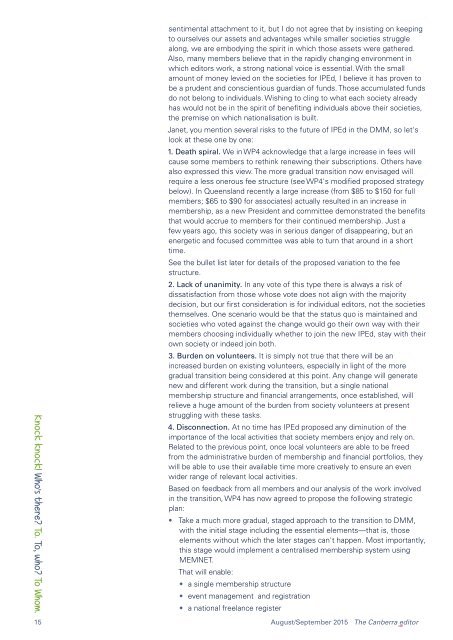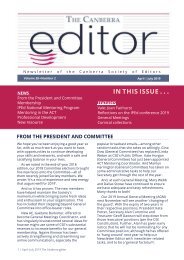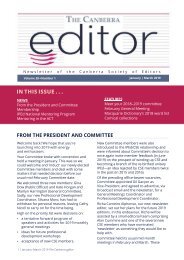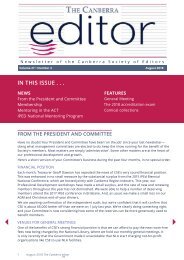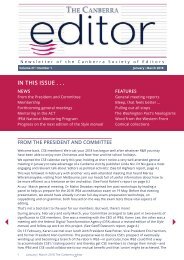The Canberra editor August-September 2015
Newsletter of the Canberra Society of Editors
Newsletter of the Canberra Society of Editors
- No tags were found...
You also want an ePaper? Increase the reach of your titles
YUMPU automatically turns print PDFs into web optimized ePapers that Google loves.
Knock knock! Who's there? To. To, who? To Whom.<br />
sentimental attachment to it, but I do not agree that by insisting on keeping<br />
to ourselves our assets and advantages while smaller societies struggle<br />
along, we are embodying the spirit in which those assets were gathered.<br />
Also, many members believe that in the rapidly changing environment in<br />
which <strong>editor</strong>s work, a strong national voice is essential. With the small<br />
amount of money levied on the societies for IPEd, I believe it has proven to<br />
be a prudent and conscientious guardian of funds. Those accumulated funds<br />
do not belong to individuals. Wishing to cling to what each society already<br />
has would not be in the spirit of benefiting individuals above their societies,<br />
the premise on which nationalisation is built.<br />
Janet, you mention several risks to the future of IPEd in the DMM, so let's<br />
look at these one by one:<br />
1. Death spiral. We in WP4 acknowledge that a large increase in fees will<br />
cause some members to rethink renewing their subscriptions. Others have<br />
also expressed this view. <strong>The</strong> more gradual transition now envisaged will<br />
require a less onerous fee structure (see WP4's modified proposed strategy<br />
below). In Queensland recently a large increase (from $85 to $150 for full<br />
members; $65 to $90 for associates) actually resulted in an increase in<br />
membership, as a new President and committee demonstrated the benefits<br />
that would accrue to members for their continued membership. Just a<br />
few years ago, this society was in serious danger of disappearing, but an<br />
energetic and focused committee was able to turn that around in a short<br />
time.<br />
See the bullet list later for details of the proposed variation to the fee<br />
structure.<br />
2. Lack of unanimity. In any vote of this type there is always a risk of<br />
dissatisfaction from those whose vote does not align with the majority<br />
decision, but our first consideration is for individual <strong>editor</strong>s, not the societies<br />
themselves. One scenario would be that the status quo is maintained and<br />
societies who voted against the change would go their own way with their<br />
members choosing individually whether to join the new IPEd, stay with their<br />
own society or indeed join both.<br />
3. Burden on volunteers. It is simply not true that there will be an<br />
increased burden on existing volunteers, especially in light of the more<br />
gradual transition being considered at this point. Any change will generate<br />
new and different work during the transition, but a single national<br />
membership structure and financial arrangements, once established, will<br />
relieve a huge amount of the burden from society volunteers at present<br />
struggling with these tasks.<br />
4. Disconnection. At no time has IPEd proposed any diminution of the<br />
importance of the local activities that society members enjoy and rely on.<br />
Related to the previous point, once local volunteers are able to be freed<br />
from the administrative burden of membership and financial portfolios, they<br />
will be able to use their available time more creatively to ensure an even<br />
wider range of relevant local activities.<br />
Based on feedback from all members and our analysis of the work involved<br />
in the transition, WP4 has now agreed to propose the following strategic<br />
plan:<br />
• Take a much more gradual, staged approach to the transition to DMM,<br />
with the initial stage including the essential elements—that is, those<br />
elements without which the later stages can't happen. Most importantly,<br />
this stage would implement a centralised membership system using<br />
MEMNET.<br />
That will enable:<br />
• a single membership structure<br />
• event management and registration<br />
• a national freelance register<br />
15 <strong>August</strong>/<strong>September</strong> <strong>2015</strong> <strong>The</strong> <strong>Canberra</strong> <strong>editor</strong>


